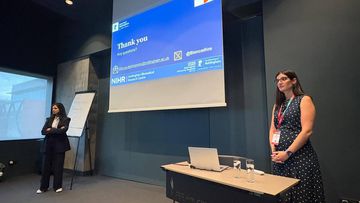The social determinants of health workstream is raising the bar: past, present… future
NewsProfessor Gavin Giovannoni, consultant neurologist, chair of the Raising the Bar steering committee and co-lead for the social determinants of health (SDoH) workstream, gave us a quick soundbite of what his team has accomplished so far, and where they are headed in the future.
Past:
Social determinants of health refers to the conditions in which people are born, grow, live, work and age. We know that poorer social determinants of health, such as education, employment, gender, ethnicity, and social inclusion to name just a few, have an impact on the health outcomes of individuals (the WHO goes into detail here).
In order to treat individuals with MS holistically and enable people to live their best lives, we must think outside a purely medical model, and that is why this area is a key workstream for Raising the Bar.
Present:
There is limited evidence on MS specifically regarding SDoH and improving outcomes: this workstream is gathering evidence and looking at models which address these areas, so that we can improve outcomes in the future.
We know that:
- The MS Society recently found that 3 of 5 people with MS report loneliness or isolation.
- A report analysing social determinants of health and the likely risk of severity from COVID-19 found that people from poorer socio-economic backgrounds, BME populations, and smokers are at higher risk (Abrams, 2020).
- There are links with the MS Register's work on smoking and MS,
- smoking is 4 times more likely among the lowest socio-economic groups compared to highest (Hiscock, 2012)
- smoking is related to poorer health outcomes in MS (more in our update on the Register's work next week)
The workstream has developed a survey to gauge current healthcare practitioners' engagement with SDoH in their work with people with MS.
- This is an area of health which affects us all - please complete the survey to help us gather the data we need to affect change.
Future:
By understanding how people with MS's outcomes are affected by SDoH, we can see where healthcare practitioners can have the most impact - and can incorporate this into practice.
We can all do something about this and adapt our practice to better support people with MS - starting now.
For example:
- Do you ask people with MS if they are food secure? There has been a massive increase in access to food banks lately with the Trussell Trust estimating that 100,000 new families accessed the resource between April and June this year and 6 food parcels a minute expected to be delivered this winter.
- Some MS Centres keep records of those with MS who are needing access to food banks to ensure they are being supported
- Do you use social prescribing or are you aware of patients who are in receipt of this via primary care?
Could you find out who your social prescribing link worker is?
Related articles
Encouraging excellence, developing leaders, inspiring change
MS Academy was established in 2016 and in that time has accomplished a huge amount with exciting feedback demonstrating delegates feel inspired and energised along their personal and service development journeys. The various different levels of specialist MS training we offer are dedicated to case-based learning and practical application of cutting edge research.


